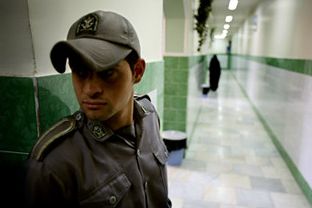UN experts alarmed by Iran's denial of healthcare to detainees

UN human rights experts on Wednesday voiced deep concern over Iran's persistent refusal to grant "timely and adequate healthcare" to human rights defenders and other detainees.

UN human rights experts on Wednesday voiced deep concern over Iran's persistent refusal to grant "timely and adequate healthcare" to human rights defenders and other detainees.
They highlighted a troubling pattern of ill-treatment among Iranian detainees, marked by inadequate access to essential medical care, with a particular emphasis on the plight of human rights activist and Nobel Peace Prize laureate Narges Mohammadi.
“Our deep concerns about the physical and mental integrity of Narges Mohammadi have been communicated to the Iranian Government,” the experts said in a statement released on the UN website.
The statement further highlighted the situation of other detainees, including Fatemeh Sepehri, a prominent political prisoner and outspoken critic of the Islamic Republic. Despite suffering from a heart condition, Sepehri has faced a cumulative punishment of 37 1/2 years, raising serious concerns over her well-being.
“We are equally concerned for Fatemeh Sepehri, Mahmoud Mehrabi, Davood Razavi, Hasan Saeedi, and Reza Shahabi Zakaria, who have been denied access to appropriate healthcare despite medical tests and reports indicating the urgency of their cases,” the experts said.
According to medical specialists and corroborated by MRI and CT scan examinations, Mohammadi has endured acute back and knee pain, including a herniated spinal disc, over the past eight months, the website reported.
Earlier in August, Mohammadi was reportedly subjected to physical violence by prison guards in the women’s ward of Evin Prison, resulting in her loss of consciousness and injuries to her ribcage and other parts of her body.
The violence erupted after Mohammadi and several female prisoners gathered in the prison yard to protest the death penalty imposed on a 34-year-old Iranian arrested during the 2022 anti-government protests in Kermanshah province.
Following the protest, the women’s ward was "flooded with military forces," and an order was issued to "assault the protesters," according to the statement. The ensuing violent crackdown led to severe beatings, with some prisoners sustaining physical injuries while others suffered nervous breakdowns.
During the assault, Mohammadi, who suffers from a heart condition, was "repeatedly punched in the chest by male military and security guards," causing her to collapse in the prison yard with intense chest pain. Despite her condition, no attempts were made to transfer her to the infirmary or a hospital.
“The denial of medical care appears to be used to punish and silence Mohammadi inside prison. These reports raise serious concerns regarding her right to health and physical well-being,” the UN experts stated.
The experts emphasized that “the healthcare of prisoners, as well as the obligation not to expose any prisoner to ill-treatment, is the responsibility of the State,” reminding that the Islamic Republic of Iran is a party to the International Covenant on Economic, Social and Cultural Rights (ICESCR) and the International Covenant on Civil and Political Rights (ICCPR). “Prisoners have the right to equivalent healthcare available in the community and must be given prompt access to medical attention in urgent cases,” the experts underscored.
“We reiterate our calls for the immediate release of human rights defenders and all other individuals in Iranian detention facilities who are currently being held arbitrarily,” the statement added.
The statement was authored by 15 human rights experts, including Mai Sato, who assumed the role of the seventh UN Special Rapporteur on Human Rights in Iran this July, succeeding Javaid Rehman, who had fulfilled the mandate for the maximum six-year term permissible for a Special Rapporteur.
Amnesty International has underscored the gravity of the situation, asserting that Iranian officials have effectively turned the nation’s prisons into "waiting rooms of death."
According to a 2022 report by Amnesty International, Iranian authorities are perpetrating alarming violations of the right to life by deliberately denying ailing prisoners access to lifesaving healthcare. This "deadly cruelty" involves both blocking or delaying emergency hospitalization and consistently denying adequate medical care throughout imprisonment. As a result, prisoners' health deteriorates, leading to unnecessary pain and suffering and, in some cases, preventable loss of life.
The rights group further highlighted that numerous cases of suspicious deaths in custody, potentially linked to the denial of medical care, have emerged in recent years, underscoring a troubling crisis of impunity for violations of the right to life.